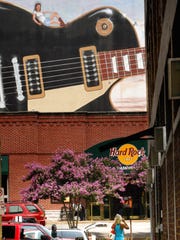Illegal Airbnb hosts in Nashville will soon have a harder time avoiding enforcement.
Metro is in the process of hiring two new code inspectors to crack down on roughly 1,000 short-term vacation rentals that are operating illegally in the city.
Mayor David Briley announced this week that the annual permit application fee for short-term rental hosts will be hiked from $50 to $313 in order to pay for the added staff.
“We have over 1,000 unpermitted, but currently operating, short-term rentals in Nashville,” Briley said. “So it’s clearly an issue.”
Airbnb disputes heat up
The increased enforcement comes as the city’s legal fights over the properties escalate.
In February, 29-year-old Layton Jones was sentenced to a few days in jail after repeatedly ignoring orders to shut down his illegal Airbnb.

A tourist takes a photo of the Hard Rock Cafe on Lower Broadway in downtown Nashville on July 25, 2007. (Photo: Larry McCormack / The Tennessean)
The following month, several Davidson County Chancery Court judges issued contempt-of-court violations against the Metro Codes Department. The action was in response to dozens of lawsuits filed by short-term rental hosts because their permits were rescinded after Codes officials said they issued them by mistake. Violation notices were sent to plaintiffs after the legal complaints were filed, prompting the contempt-of-court violations.
2,188 permits granted last year
Short-term rental hosts are required to obtain a permitby filing a floor plan, proof of insurance, identification records, proof of tax payments, neighbor notification documentation and inspections with Codes and Building Safety.
In addition, hosts who receive more than $3,000 in income a year from the properties must get business licenses.
Metro has issued 756 short-term rental permits so far this year.
In 2018, 2,188 permits were granted.
Airbnb reported paying $22.4 million in Tennessee taxes last year, with the majority of its hosts based in Nashville. Taxes include a 7% state sales tax, a local tax of 1.5% to 2.75%, and a 6% hotel occupancy tax.
‘Nuisance properties’ targeted
The city relies on Host Compliance, a private investigation firm, to find unpermitted short-term rentals on websites like Airbnb.com, VRBO.com and HomeAway.com.
The company scours online home rental listings and cross references them with the list of active permits, then sends the initial violation notice to illegal operations. They are fined $50 a day.
Metro Codes inspectors handle additional enforcement if illegal operators don’t comply with the Host Compliance notice. They also follow up on complaints about noise, parking, trash and other issues.
Currently, Metro Codes has two inspectors targeting problems with short-term rentals. So the added staff will effectively double the level of enforcement.
“We get a fairly steady stream of complaints,” said Codes Administration spokesman Sean Braisted. “If we’re able to reduce the backlog (of illegally operating properties), it will allow us to have more resources available to go after the nuisance properties.”
Complaints may be filed at hostcompliance.com/tips or by calling 435-STR-HELP.













